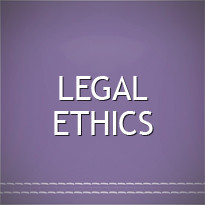A.M. No. 01-12-03-SC – 434 Phil. 503 – Legal Ethics – CPRA; Canon II; Propriety – Sub-Judice Rule – Free Speech Not a Defense
In 2001, Estrada vs Sandiganbayan was being heard by the Supreme Court. One of the issues raised in the case was the constitutionality of the Plunder Law. In November 2001, Atty. Leonard De Vera, a leader of the Estrada Resign Movement, gave an interview to the Philippine Daily Inquirer where he stated that Estrada has the capacity to bribe the justices and that the justices may declare the plunder law unconstitutional but that such decision will not be accepted by the people.
In December 2001, the Supreme Court directed Atty. De Vera to explain why he should not be cited for indirect contempt. In his Answer, he admitted that he “suggested that the Court must take steps to dispel once and for all these ugly rumors and reports” that “the Court would vote in favor of or against the validity of the Plunder Law” to protect the credibility of the Court. Atty. De Vera admitted further to “having appealed to the Supreme Court to dispel rumors that it would vote in favor of a petition by Estrada’s lawyers to declare the plunder law unconstitutional for its supposed vagueness” because he and his group were “greatly disturbed” by such rumors. He said that a decision by the SC declaring the Plunder Law unconstitutional “would trigger mass actions, probably more massive than those that led to People Power II.”
Atty. De Vera justified his statements as protected by free speech.
ISSUE: Whether or not Atty. De Vera is protected by free speech.
HELD: No. Freedom of speech includes the right to know and discuss judicial proceedings, but such right does not cover statements aimed at undermining the Court’s integrity and authority, and interfering with the administration of justice. Freedom of speech is not absolute, and must occasionally be balanced with the requirements of equally important public interests, such as the maintenance of the integrity of the courts and orderly functioning of the administration of justice. Thus, the making of contemptuous statements directed against the Court is not an exercise of free speech; rather, it is an abuse of such right. Unwarranted attacks on the dignity of the courts cannot be disguised as free speech, for the exercise of said right cannot be used to impair the independence and efficiency of courts or public respect therefor and confidence therein.
Atty. De Vera’s utterances pressuring the Court to rule in favor of the constitutionality of the Plunder Law or risk another series of mass actions by the public cannot be construed as falling within the ambit of constitutionally-protected speech, because such statements are not fair criticisms of any decision of the Court, but obviously are threats made against it to force the Court to decide the issue in a particular manner, or risk earning the ire of the public. Such statements show disrespect not only for the Court but also for the judicial system as a whole, tend to promote distrust and undermine public confidence in the judiciary, by creating the impression that the Court cannot be trusted to resolve cases impartially and violate the right of the parties to have their case tried fairly by an independent tribunal, uninfluenced by public clamor and other extraneous influences.


